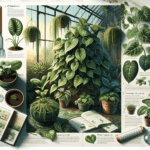The philosophy of organic growing is rooted in the use of natural methods to cultivate plants and produce crops without the use of synthetic chemicals or genetically modified organisms. It centers on the belief that working with nature, rather than against it, leads to healthier soil, plants, and ecosystems. Organic growing emphasizes the importance of environmental sustainability, ethical practices, and holistic approaches to agriculture.
The Importance of Sustainable Agriculture
Sustainable agriculture is vital for the long-term health of our planet. By minimizing the use of artificial inputs and supporting biological diversity, organic growing contributes to the conservation of natural resources and the protection of ecosystems. Making conscious choices about how we grow and consume food can positively impact not only our own well-being but also that of future generations.
Before diving into organic growing, it’s essential to grasp the basics of plant growth. Understanding how plants grow will help you cultivate them more effectively.
Understanding the basics of plant growth
Plants require water, sunlight, and nutrients to thrive. Learning about the different stages of plant growth and the specific needs of various plants will help you care for them properly.
Choosing the right location for your garden
Selecting a suitable location is crucial for your organic garden. Look for an area that receives adequate sunlight and has well-draining soil. Also, consider proximity to a water source for irrigation.
Preparing the soil for optimal plant growth
Preparing the soil is a vital step in organic growing. Properly aerating and amending the soil with organic matter will provide a nourishing environment for your plants to flourish.
III. Selecting and Sowing Seeds
A. Choosing the right seeds for your climate and soil
When picking seeds, it’s crucial to consider your climate and soil type to ensure successful plant growth. Certain seeds thrive better in specific climates, so be sure to choose varieties that are well-suited to your local conditions. Additionally, different soil types can impact how different seeds grow, so it’s important to select seeds that can adapt to your soil’s composition.
B. Understanding seed germination and propagation techniques
It’s essential to have a good grasp of seed germination and propagation techniques to ensure successful plant growth. Properly understanding these methods is key to efficiently nurturing and growing your plants from seeds. Mastering the art of seed germination and propagation will increase the chances of strong, healthy growth for your plants.
C. Sowing and transplanting seedlings for successful plant growth
Successfully sowing and transplanting seedlings is vital for the healthy development of your plants. Pay attention to proper sowing depth and spacing when planting your seeds, as this can significantly impact their growth. Carefully transplanting seedlings is equally important in ensuring they thrive in their new environment, so handling them with care during this process is crucial.
Growing Healthy Plants
Providing the Right Nutrients for Plant Growth
Paying attention to providing adequate nutrients is essential for promoting healthy plant growth. This includes feeding your plants with organic fertilizers and ensuring that they are receiving the appropriate amount of water and sunlight.
Managing Pests and Diseases Organically
Dealing with pests and diseases without using harmful chemicals is important for maintaining an organic garden. Employing natural pest control methods and using disease-resistant plant varieties can help in managing issues that may arise.
Utilizing Companion Planting and Crop Rotation for Healthy Plant Growth
Incorporating companion planting and crop rotation in your garden strategy can play a significant role in promoting healthy plant growth. By planting complementary crops together and regularly rotating planting locations, your plants can benefit from improved soil fertility and reduced pest pressure.
Investing in cultivating healthy plants through proper nutrition, organic pest and disease management, as well as strategic planting practices can lead to successful gardening endeavors.
When and How to Harvest Different Types of Plants
It is important to know when and how to harvest different types of plants in order to maximize their yield and flavor. For example, leafy greens and herbs should be harvested earlier in the day when they are full of moisture and have not been dried out by the sun. Root vegetables should be harvested in the morning or evening to avoid the heat of the day, which can cause them to become tough and bitter. Fruits should be harvested when they are fully ripe and have reached their peak flavor.
Properly Storing and Preserving Harvested Produce
Once your produce has been harvested, it is essential to store it properly to maintain its freshness and flavor. Different types of produce require different storage methods. For example, root vegetables can be stored in a cool, dark place with high humidity, while fruits should be stored in the refrigerator to slow down the ripening process. It is also important to preserve excess produce through methods such as canning, freezing, or drying to enjoy them later in the year.
Seed Saving and Maintaining a Sustainable Plant Cycle
Seed saving involves collecting and storing seeds from your plants to ensure a sustainable plant cycle. By saving seeds from your best-performing plants, you can continue to grow strong and healthy crops year after year. It is important to properly dry and store seeds to ensure their viability for future planting. Additionally, practicing seed-saving techniques helps preserve plant biodiversity and reduces reliance on commercial seed sources.
There are several ways to extend the growing season for organic plants. These techniques can help you prolong the time during which you can grow and harvest your crops.
Using Season Extension Techniques
One method for extending the growing season is by using season extension techniques, such as cold frames, row covers, and high tunnels. These structures provide protection from the elements, allowing you to start planting earlier in the spring and continue later into the fall.
Maximizing Plant Growth in Different Climates
It’s important to maximize plant growth in different climates in order to extend the growing season. This can be achieved through choosing plant varieties that are well-suited to your specific climate, providing adequate water and nutrients, and protecting plants from extreme temperatures.
Implementing Organic Methods for Year-Round Plant Cultivation
To cultivate plants year-round using organic methods, you can use techniques such as succession planting, crop rotation, and optimizing soil health. By carefully planning and managing your garden, you can ensure a continuous supply of fresh produce throughout the year.
Understanding the market for organic produce
Farming organically requires a keen understanding of the market for organic produce. Growers must assess the demand for these products in their local area and beyond to ascertain where their crops will sell best. Analyzing consumer behaviors and purchasing patterns is integral to target the right markets and maximize profit potential.
Developing a successful marketing strategy for selling organic plants
An effective marketing strategy is crucial for the successful sale of organic plants. This includes creating an appealing brand image, utilizing various promotional channels such as social media, farmers markets, and community events. Emphasizing the benefits of organic produce, such as its sustainable and eco-friendly nature, can attract environmentally-conscious consumers and boost sales.
Maintaining the integrity of organic growing practices while selling produce
It’s important to maintain the integrity of organic growing practices when selling produce. This involves adhering strictly to organic farming methods, ensuring that all certification and labeling requirements are met. Honesty and transparency in communication with customers about the organic growing process will build trust and credibility, which are vital in this market.





